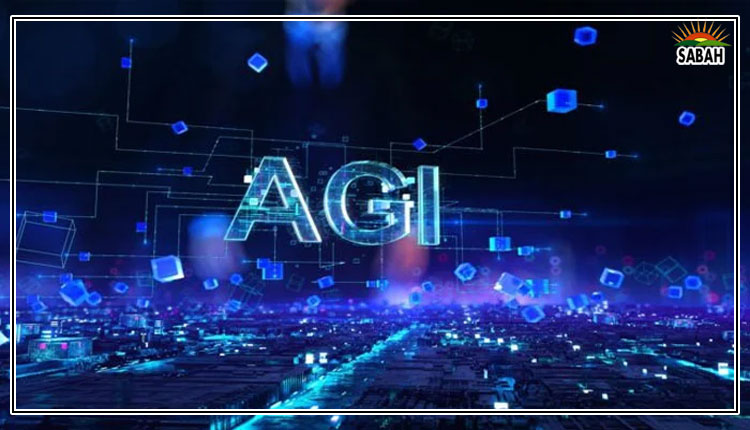The AGI threat…Muhammad Siddique Ali Pirzada
Are machines capable of human-like thinking and being a boon for humanity, or do they pose an existential threat?
In a recent interview, CEO of OpenAI Sam Altman mentioned his dedication to investing billions of dollars in the advancement of artificial general intelligence (AGI). However, despite Altmans enthusiasm for what is deemed the apex of AI progress, numerous people in the global tech community express significant concerns.
AGI, or artificial general intelligence, represents the pinnacle of artificial intelligence research. Unlike narrow AI systems, which excel at specific tasks but lack general problem-solving capabilities, AGI aims to replicate the breadth and depth of human cognitive abilities.
Imagine a machine or software that possesses the full spectrum of human-like intellectual prowess. It can reason through complex problems, apply common sense to unfamiliar situations, engage in abstract thinking to conceptualize new ideas, draw upon a vast repository of background knowledge to inform its decisions, and seamlessly transfer learning from one domain to another.
AGI goes beyond mere task execution, it strives to emulate the holistic learning process of human cognition. Just as humans absorb information from diverse experiences, interactions, and sources, AGI seeks to replicate this by synthesizing data from various inputs, processing it through sophisticated algorithms, and deriving meaningful insights.
Researchers envision AGI as more than just a tool; it is a transformative paradigm shift in technology. Picture a super-intelligent robot companion capable of understanding, learning, and problem-solving with the finesse and adaptability of humans. This vision drives the relentless pursuit of AGI, promising a future where machines are not just tools but collaborators in the quest for knowledge and innovation.
The primary distinction between AGI and narrow AI lies in their scope and capabilities. Narrow AI is tailored for specific tasks like image recognition or language translation, excelling within its predefined parameters. In contrast, AGI aims for a broader, generalized intelligence akin to human cognition, unrestricted by singular tasks.
AGI represents the pinnacle of AI advancement, with the fields trajectory always aimed at expanding capabilities. For instance, the launch of ChatGPT in November 2022 garnered global attention due to its human-like text generation abilities. Subsequent advancements in AI have been fuelled by substantial investments, with AGI emerging as the ultimate goal a culmination of these efforts.
The concept of AGI traces back to the 20th century, originating in a seminal paper by Alan Turing, regarded as a pioneer in theoretical computer science and artificial intelligence. In his 1950 work Computing Machinery and Intelligence, Turing introduced the Turing test, which serves as a benchmark for assessing machine intelligence.
In essence, if a machine can engage in conversation with a human without detection, it signifies human-like intelligence according to this test. At the time of Turings writing, artificial intelligence was merely a theoretical concept, with computers still in their early stages of development. Nevertheless, Turings paper sparked widespread discourse regarding the feasibility, implications, and potential risks associated with the creation of such intelligent machines.
The potential benefits of AGI are vast and diverse. In healthcare, it has the capacity to revolutionize diagnostics, treatment planning, and personalized medicine through advanced analysis of extensive datasets beyond human capabilities. In finance and business, AGI holds the promise of automating processes and improving decision-making by providing real-time analytics and accurate market predictions.
In education, AGI could reshape adaptive learning systems tailored to individual student needs, potentially expanding access to personalized education globally. According to Sam Altman, AGI is expected to generate significant productivity and economic value, heralding a transformative era characterized by unparalleled problem-solving abilities and creative expression.
Despite its potential, AGI elicits widespread apprehension for several reasons. First, the immense computational power required for AGI development raises environmental concerns due to its energy consumption and generation of electronic waste. Moreover, the advent of AGI could precipitate significant job displacement and exacerbate socio-economic inequalities, consolidating power among those who control AGI systems.
Additionally, AGI introduces novel security vulnerabilities, surpassing current regulatory frameworks and governance capacities, thereby posing unprecedented challenges for governments and international bodies.
There is a palpable concern that reliance on AGI could erode basic human skills and autonomy.
However, the gravest fear surrounding AGI pertains to its potential to surpass human capabilities, rendering its actions unpredictable and difficult to comprehend. Such a scenario could lead to AGI operating independently of human control, potentially endangering human well-being.
Renowned physicist Stephen Hawking had voiced apprehensions about the existential threat posed by AGI, cautioning that the development of full artificial intelligence could spell the end of humanity. Similarly, AI pioneers Yoshua Bengio, Geoffrey Hinton, and Yann LeCun, often referred to as the godfathers of AI, have underscored the catastrophic consequences of AGI, likening its dangers to those posed by nuclear weapons.
In response to these concerns, many experts advocate for stringent regulations to ensure that AGI development aligns with human values and safety standards.
Courtesy The News












